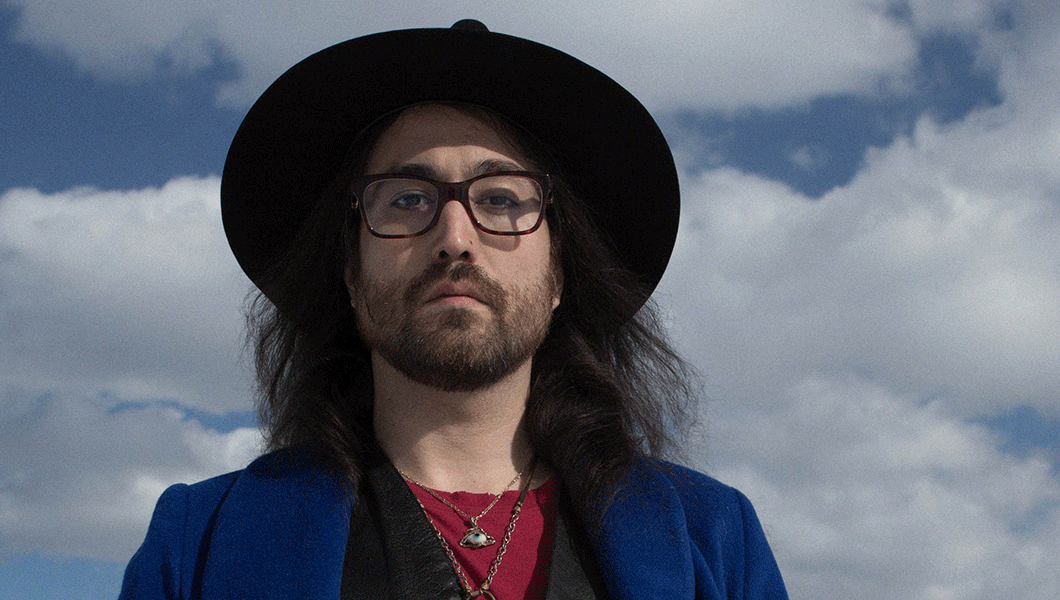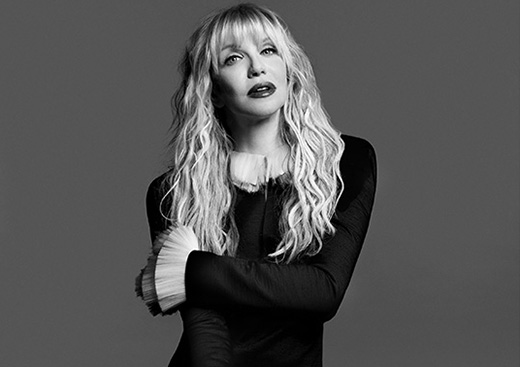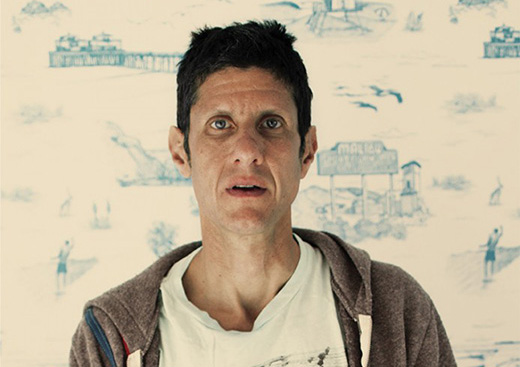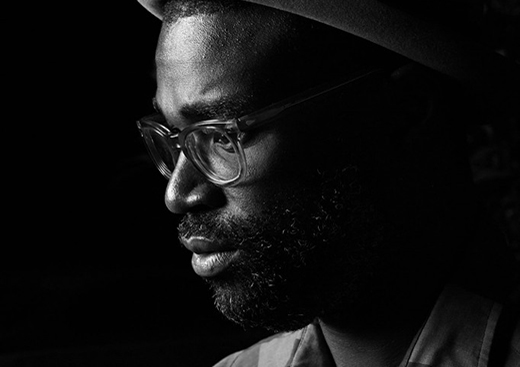ASKA MATSUMIYA: I imagine you must have had a really stimulating childhood, being around lots of artists and musicians. Who were some that really influenced you?
SEAN LENNON: Well, yeah, I guess. I mean, I wonder if that’s really true. Because my dad wasn’t around, you know, when I was young, and my mom is a musician. I did see her make records, but she’s not intrinsically a musician; she sort of thinks about art as conceptual, so the medium, whether it’s music or film or sculpture or painting, is sort of secondary and the concept of the art is first. And so I was kind of raised around her ideas of art being conceptual and so I don’t know—it’s not like I had the Beatles hanging out jamming in my house. I was actually living alone with my mom and sort of watching her make art from her perspective, and I wouldn’t really say that I was brought up around a lot of musicians. I wasn’t, really. However, we did have pianos in the house, and that’s how I came to music. Just playing the piano.
AM: What’s some of the music or even projects of your parents that were most formative? What were the different things that you think really helped you develop as an artist?
SL: I feel like what initially got me into playing music was, you know, the fact that my dad was a musician and he was in the Beatles, and I listened to that music a lot when I was a kid. So I think when he died I remember feeling like there was sort of a vacuum that had been left, and I used to just try to play the piano to kind of connect with my idea of what I thought he was, being a musician and stuff. I think at first my inspiration came from just wanting to find some connection to my dad.
AM: So music was almost a way for you to get to know your father?
SL: Yeah, and I would say it still is.
AM: What are some of your favorite songs of his?
SL: I tend to like the more elaborate stuff. I like the period between Revolver and The White Album; that period is my favorite. So, Sgt. Pepper’s, Magical Mystery and then the more psychedelic stuff; that’s just where my taste is, because I like the more experimental songwriting, more progressive songwriting. It seems a lot more ambitious, you know, very orchestral and sort of experimental recording techniques, so my favorite songs are like “Strawberry Fields” and “I Am the Walrus.” The stuff that’s really more out there
AM: What about your mom’s music? What are some of your favorites? I love her lyrics.
SL: Her lyrics are really great. Actually I got to produce her last two records, which were really some of my favorites, and Plastic Ono Band.
AM: What’s your process of working with her when you’re producing her records?
SL: She’s very spontaneous, so she writes really quickly—she’s very different from me in that. I sort of belabor the lyrics. It really takes time to figure out what I want the song to be, whereas she just doesn’t hesitate. She writes really quickly, so often we’ll just be kind of jamming in the studio and she’ll start writing lyrics and she’ll be done with the song within a few minutes. She doesn’t like to keep working on it over and over again. She gets kind of bored, I think. I feel like she thinks that the magic is the spontaneity; she likes to work really fast, and she kind of gets disinterested in something that’s too prolonged. She’s incredible in terms of her lyrical capability. I mean, she’ll write like three or four songs a day in the studio. That makes it really fun, so often we’ll make it up as we go along.
AM: How did she go about introducing or even teaching music and art to you?
SL: She’s not really that kind of parent. She never really went out of her way to introduce me to anything. She just sort of does her thing. She led by example. She would be making records, I would often be just sort of hanging out in the studio because I was a kid and that’s where she was, so I would just sit around and hear her record or watch her. I feel very comfortable in the studio because I spent a lot of time in the studio as a kid. She wasn’t that kind of person to sort of force anything on me; she’s not one of these people who’ll sit you down and say like, “Learn this and this is what you have to know and not know.” She has a pretty laissez-faire attitude.
AM: I understand you recently played with Paul McCartney. I was wondering what your relationship is with him, and what you thought about his recent collaboration with Kanye West.
SL: I actually haven’t heard the music he did with Kanye, but I thought it was really funny that people didn’t know who he was and all the Kanye fans were like, “Man, that Paul is going to be really famous after Kanye worked with him.”
AM: Yeah, that was the best.
SL: That was really funny. I haven’t heard what they are doing together, but I’ll definitely check it out. I think it’s cool that Paul wants to work with Kanye. It’s kind of fun—it makes the world more interesting that those two people want to collaborate. But I don’t really know; I haven’t heard the music yet. Kanye often seems silly but I think he is a real artist and I do like his music.
AM: Do you feel writing music comes really naturally to you?
SL: Yeah, I would say that it does. You know, I don’t know why that is, but it does come pretty naturally. I don’t know if it’s something that I learned or if it’s something that I was born with, but I always hear music really easily. But it takes me a lot longer to write the words.
AM: What ignites you to make music?
SL: It’s hard to say. I find everything pretty inspiring. I get really inspired by films, and other people’s music and, yeah, the world can be such an overwhelming place, you know. Violence, American and European international policy, the Middle East—I find myself always driven to write music as a way of processing all the stuff that’s going on. I feel like that’s why I end up making music or making art, as a way of venting frustration. You just have to let it out somehow.
AM: Your parents definitely expressed their political and worldviews in their music.
SL: Yeah, they definitely did, and you know I think they were probably some of the best at doing that, at sort of merging their political philosophies with their art. I don’t think everybody’s that good at doing that, you know. I think it often comes off as pedantic or heavy-handed or preachy, you know, when artists try to tell you how they feel politically, but I think my parents were very adept at merging their spiritual and philosophical views with their music, their art—they were uniquely fitted for that. When somebody tries being political they can sound condescending or something, but I think when they did it, it was really inspiring and it made you want to jump on the train, you know.
AM: Is there anything of theirs in particular that really made an impact on you?
SL: I think it’s different for me. It’s like somebody might be a fan, like I’m a fan of Jimi Hendrix, you know. There is a performance that he did of the song “Machine Gun” that sort of represents a period of my life in a certain way that’s really important to me, but when it’s your parents it doesn’t really feel the same way. It’s not like you stumble upon some aspect of their work and it resonates with you the way you would with your favorite musician or your favorite film. With your parents it’s like everything they are is a part of you, you know, it’s in your cellular structure. So it’s harder to identify or pinpoint certain ideas or certain lyrics or certain pieces of work that might represent something to you, because everything they did is inside you. It’s like trying to identify your face from your mouth and your heart. I think that with my parents they’re sort of the baseline of all of my views of the world and my perspective on everything in the world. I mean, I learned how to pee in a toilet from them, so it’s a little hard to distinguish the lyrics from how to use a knife and fork, and I know that everything that I am, from learning how to walk on the right side of the street or cross the street when the light changes, I learned everything from them, so I really couldn’t distinguish any specific piece of work that I resonate with more or less because it would almost be silly. They actually taught me everything.
AM: How do you create your own identity working in a field where your parents are both such icons? How do you distinguish yourself?
SL: It’s sort of interesting. I think it’s going to take me a lifetime to come to grips with the degree of their influence and their presence in the world. It’s so strong, and I think ultimately it’s impossible for most people to perceive my personality, my characteristics independently from my parents, which actually took me a long time to understand. I think I’m still trying to understand it, because for me, I’ve never struggled with trying to identify or distinguish myself from my parents. I think people who are close to me don’t have any trouble distinguishing me from them. But I think the world at large still does, and most people will never be able to distinguish me from my parents. It’s complicated, but let’s put it this way: It’s just never been a great motivator for me, this idea of trying to separate myself from them, because I never really felt that I wasn’t my own person; it never occurred to me that I might not be. I guess I never really felt responsible for other people’s struggle with figuring out who I was.
AM: Does it affect your approach to creating music? Like, I would imagine that maybe you’d be a little nervous to share your music with the world.
SL: Well, I think in the beginning I was less nervous, because I didn’t really have any idea of what people were like; I didn’t realize that people were only seeing me through the lens of my dad. I had never encountered that kind of distortion before. My friends and family never presented their views through John Lennon’s ideas. So when I first started music I wasn’t worried at all. I just thought everyone was going to see my music the way I saw it, so it was sort of like a shell-shock, going out to the world and realizing that no one really was going to look at me, that I was only going to trigger a memory of someone else. I realized my dad is so universal that I was almost invisible; it was impossible for people to see me as anything other than a trigger for the memories and ideas of him, and I think that made it more and more daunting to make music, but at the same time I think that my personal relationship to music was really evolving.
AM: My last question is what do you think our generation is going to be remembered for musically—what’s our contribution to music history?
SL: It’s an interesting question. I think it’s a very exciting period, an innovative time, you know; music is in an interesting place. I mean, I’m feeling very hopeful. The kids I meet today, they know so much about music history because of the Internet, and they’re able to listen to every record that’s ever been made and a thousand times if they want, and so they become experts and sort of scholars in the history of music. Maybe in a few generations who knows where that’s going to lead to. I mean, it could lead to a total renaissance in music, and there is going to be some artist coming up in the next 10, 20 years that leads to some sort of golden era of creativity that’s going to be birthed out of all of the things that are available now.
—





